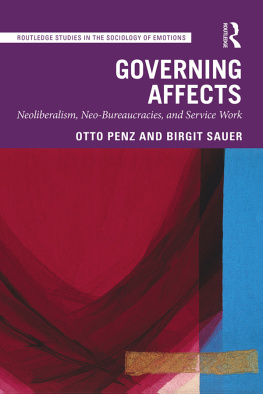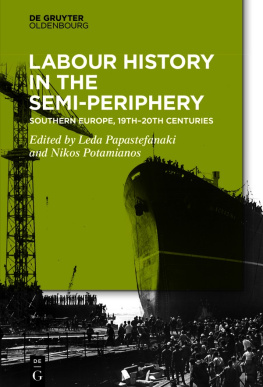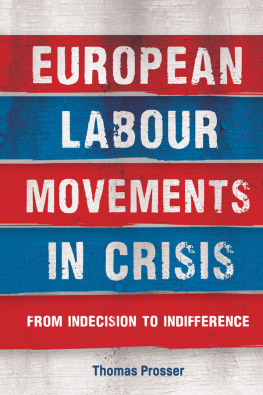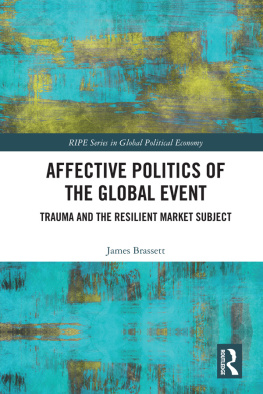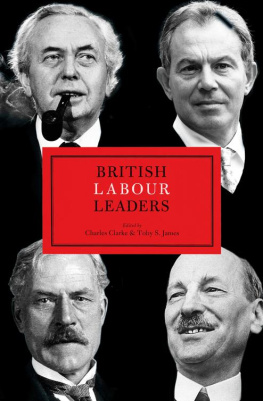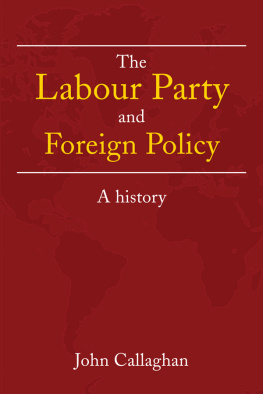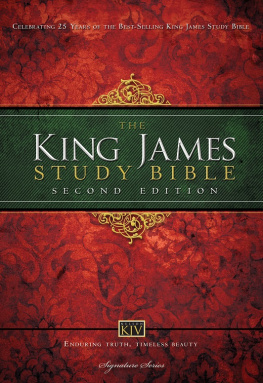
Affective LabourAffective Labour
(Dis)assembling Distance and Difference
James M. Thomas
and
Jennifer G. Correa
LondonNew York
Published by Rowman & Littlefield International Ltd.
Unit A, Whitacre Mews, 26-34 Stannary Street, London SE11 4AB
www.rowmaninternational.com
Rowman & Littlefield International Ltd. is an affiliate of Rowman & Littlefield
4501 Forbes Boulevard, Suite 200, Lanham, Maryland 20706, USA
With additional offices in Boulder, New York, Toronto (Canada), and Plymouth (UK)
www.rowman.com
Selection and editorial matter James S. Thomas and Jennifer Correa 2016
Copyright in individual chapters is held by the respective chapter authors.
All rights reserved. No part of this book may be reproduced in any form or by any electronic or mechanical means, including information storage and retrieval systems, without written permission from the publisher, except by a reviewer who may quote passages in a review.
British Library Cataloguing in Publication Data
A catalogue record for this book is available from the British Library
ISBN: HB 978-1-7834-8389-1
PB 978-1-7834-8390-7
Library of Congress Cataloging-in-Publication Data
Names: Thomas, James M., 1982- author. | Correa, Jennifer G., author.
Title: Affective labour : (dis)assembling distance and difference / James M. Thomas and Jennifer G. Correa.
Description: London ; New York : Rowman & Littlefield International, [2016] | Includes bibliographical references and index.
Identifiers: LCCN 2015038714| ISBN 9781783483891 (cloth : alk. paper) | ISBN 9781783483907 (pbk.) | ISBN 9781783483914 (electronic)
Subjects: LCSH: Social conflictUnited States. | EqualityUnited States. | United StatesSocial conditions21st century.
Classification: LCC HN90.S62 T46 2016 | DDC 306.0973dc23 LC record available at http://lccn.loc.gov/2015038714

The paper used in this publication meets the minimum requirements of American National Standard for Information SciencesPermanence of Paper for Printed Library Materials, ANSI/NISO Z39.48-1992.
Printed in the United States of America
Contents
Acknowledgements
JT
Id like to thank my friend and collaborator, Jennifer, for joining me to work through ideas that, alone, would be far less developed than they are within this book. Our work together has fed me, and continues to feed me, even as it takes place with us half a countrys distance from one another.
I am thankful for the wonderful mentorship shown to me by the following individuals: David Brunsma, Wayne Brekhus, Amit Prasad, Srirupa Prasad, Mary Jo Neitz, David Embrick, Sander Gilman, Willa Johnson, and Kirk Johnson. Each of these individuals has helped usher my development as a scholar and writer, and this book is but one product of their support.
I want to thank the Department of Sociology and Anthropology at the University of Mississippi for creating the supportive and intellectually stimulating environment from which the ideas in this book were able to grow. In particular, the leadership and guidance of the Chair, Kirsten Dellinger, has been invaluable to my growth.
A debt of gratitude also extends to the University of Mississippis Critical Race Studies Group, the Junior Faculty Writing Workshop, and the Radical Democracy Reading Group, all of which have provided me intellectual and moral support since arriving in Oxford.
Finally, I want to thank my better half, Afton. Her love, support, and constant encouragement are the reason anything and everything I do is possible. Olive and Noah, Daddy loves you, and I hope you one day read this book!
Jennifer
First, Id like to thank my friend and colleague JT for inviting me to envision, along with him, the ways in which our experiential knowledge in the field could inspire new discussions in the field of affect studies. Embarking on this journey with you has been a transformative act. Feminist writer Gloria Anzalda reminds us that writing is truly an embodied gesture, an act that can free the spirit and heal the wounds within ourselves and in society. Thank you for allowing me the opportunity to accompany you on this quest.
The ability to conduct research can be, at times, difficult to fund on our own. Parts of the data used in the book were collected during the time that I was a graduate student at the University of Missouri-Columbia. I am grateful for being awarded the Gus T. Ridgel Fellowship during my graduate student years while at Mizzou. This fellowship made it possible for me to travel down to the Texas-Mexico border in order to conduct my research. In addition, I am thankful to the Sociology Department at Mizzou for awarding me with the Robert Habenstein Dissertation Award, which was also very helpful in funding my research trips to Texas. Furthermore, the guidance and support I have received from my dissertation chair Tola Pearce and committee members Jay Gubrium and Amit Prasad in conducting my research as well as my writing has been invaluable. They continue to be a strong network of support in my professional career. As a faculty member in the Sociology/Anthropology Department, the University of Wisconsin-Parkside has also generously funded my research by providing me with travel funds to complete my interviews on the border. These sources of financial assistance have made my work possible.
Finally, I thank my parents for instilling in me a relentless drive for knowledge and the need to question. As the product of a Mexican immigrant mother and a south Texas vaquero (cowboy) ranch hand, and living in a rural Texas town steeped in a rich history, I developed an inquisitive lens from which to view the world at a young age. My experiences as well as our collective experiences as a family were the driving forces that landed me squarely in the path of sociology. Thank you for providing me with a world full of love, hopeful dreams, wonder, and imagination. To Dawn, you have provided me with the spiritual nourishment needed to keep pressing on, even when things seemed impossible. During the writing of this project, you were immensely supportive, despite spending many weeknights and weekends at my computer. You are my rock. Thank you from the depths of my heart.
Introduction
Difference, Distance and Affective Labour
Difference and distance. Conjuring material, symbolic, discursive, and affective realities for us as we move through everyday life, these concepts are conjoined, forever, through practice. Difference, be it somatic, ideological, historical or something else, is always productive of distance, both social and physical. Distance, meanwhile, such as the distance between ones place of residency and their place of work, is determined by a social and political history of difference. The history of urban American cities, for example, is the history of social and political difference producing social and physical distance. From the late nineteenth century through the end of the 1960s, federal law colluded with state and local politics to produce, and then maintain, intense racial and economic segregation between whites and nonwhites, the poor and middle classes. The effects of nearly seventy years of legal residential racial segregation reverberate today, as American cities remain intensely segregated, with poor blacks and, to an extent, poor whites, suffering from enormous disparities in wealth, health, and education.



 The paper used in this publication meets the minimum requirements of American National Standard for Information SciencesPermanence of Paper for Printed Library Materials, ANSI/NISO Z39.48-1992.
The paper used in this publication meets the minimum requirements of American National Standard for Information SciencesPermanence of Paper for Printed Library Materials, ANSI/NISO Z39.48-1992.
